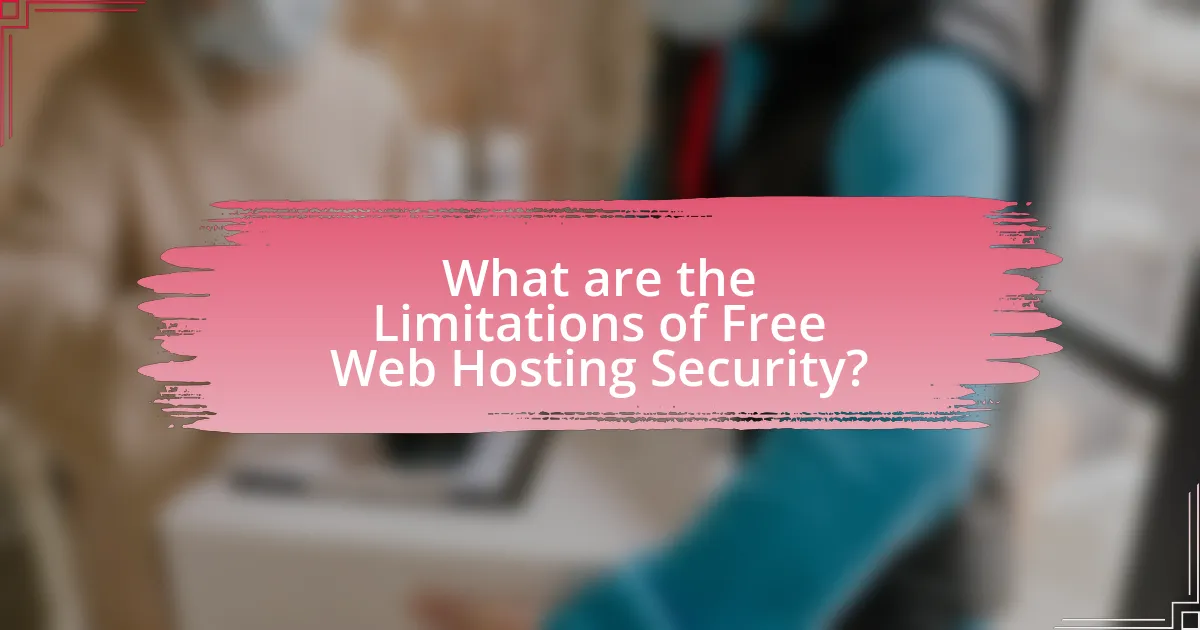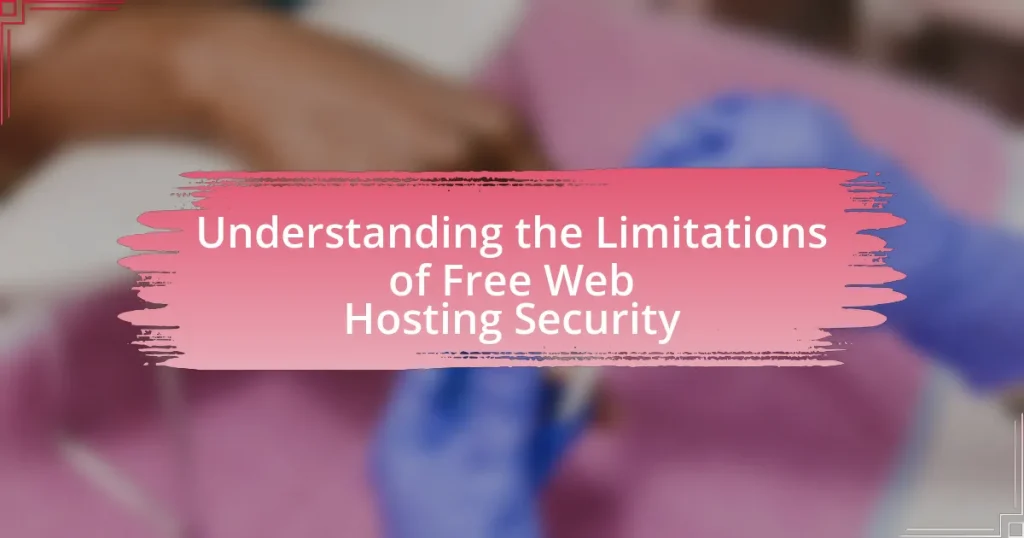Free web hosting security presents significant limitations due to inadequate security measures and resources. Many providers do not offer essential features such as SSL certificates, regular updates, or malware protection, making websites vulnerable to data breaches and cyberattacks. The lack of customer support further exacerbates these risks, as users may not receive timely assistance for security issues. This article explores the differences between free and paid hosting options, common vulnerabilities associated with free services, and the potential consequences of inadequate security, emphasizing the importance of robust security measures for website owners and users alike.

What are the Limitations of Free Web Hosting Security?
Free web hosting security has significant limitations, primarily due to the lack of robust security measures and resources. Many free hosting providers do not offer SSL certificates, leaving websites vulnerable to data interception. Additionally, free hosting often lacks regular security updates and patches, increasing the risk of exploitation by hackers. Furthermore, limited customer support means that security issues may not be addressed promptly, allowing vulnerabilities to persist. According to a 2021 study by the Cybersecurity & Infrastructure Security Agency, free hosting services are frequently targeted due to their inadequate security protocols, making them a higher risk for data breaches.
How do free web hosting services differ from paid options in terms of security?
Free web hosting services typically offer lower security compared to paid options. This difference arises because free services often lack advanced security features such as SSL certificates, regular backups, and robust firewalls, which are commonly included in paid plans. For instance, a study by HostingAdvice found that 70% of free hosting providers do not offer any form of malware protection, while paid services usually implement comprehensive security measures to safeguard user data. Additionally, free hosting platforms may share server resources among multiple users, increasing vulnerability to attacks, whereas paid services often provide dedicated resources that enhance security.
What specific security features are often lacking in free web hosting?
Free web hosting often lacks essential security features such as SSL certificates, regular backups, and malware scanning. SSL certificates are crucial for encrypting data transmitted between users and the website, yet many free hosting providers do not offer them, leaving sites vulnerable to data interception. Regular backups are typically not included, which means that users risk losing their data in case of a server failure or cyberattack. Additionally, malware scanning is frequently absent, increasing the likelihood of undetected security breaches that can compromise user data and site integrity. These deficiencies highlight the inherent risks associated with relying on free web hosting services for secure online presence.
How does the lack of support impact security in free web hosting?
The lack of support in free web hosting significantly compromises security by leaving users without timely assistance for vulnerabilities and issues. Without dedicated support teams, users may not receive critical updates or patches for software vulnerabilities, making their sites more susceptible to attacks. For instance, a study by the Ponemon Institute found that 60% of small businesses that experienced a cyber attack cited lack of IT support as a contributing factor. This absence of support can lead to prolonged exposure to security threats, ultimately resulting in data breaches or loss of sensitive information.
Why is security a critical concern for users of free web hosting?
Security is a critical concern for users of free web hosting because these services often lack robust security measures, making them vulnerable to cyberattacks. Free web hosting providers typically have limited resources to invest in security infrastructure, which can lead to inadequate protection against threats such as data breaches, malware, and hacking attempts. For instance, a study by the Ponemon Institute found that 60% of small businesses that experience a cyberattack go out of business within six months, highlighting the severe consequences of insufficient security. Additionally, free hosting platforms may not offer features like SSL certificates or regular security updates, further exposing users to risks.
What types of vulnerabilities are common in free web hosting environments?
Common vulnerabilities in free web hosting environments include inadequate security measures, lack of software updates, and shared resources leading to cross-site scripting (XSS) and SQL injection risks. Inadequate security measures often result from limited budget allocations, leaving websites exposed to attacks. The absence of regular software updates can lead to the exploitation of known vulnerabilities, as many free hosting services do not prioritize maintenance. Additionally, shared resources can create opportunities for attackers to exploit one compromised site to affect others on the same server, increasing the risk of XSS and SQL injection attacks. These vulnerabilities are well-documented in cybersecurity literature, highlighting the inherent risks associated with free web hosting services.
How can these vulnerabilities affect website owners and users?
Vulnerabilities in free web hosting security can significantly compromise both website owners and users by exposing sensitive data and leading to unauthorized access. For website owners, these vulnerabilities can result in data breaches, loss of customer trust, and potential legal liabilities due to non-compliance with data protection regulations. For users, the risks include identity theft, financial fraud, and exposure of personal information, as attackers can exploit these vulnerabilities to gain access to user accounts and sensitive data. According to a report by the Ponemon Institute, 60% of small businesses that experience a data breach go out of business within six months, highlighting the severe impact on website owners. Additionally, a study by Verizon found that 43% of cyberattacks target small businesses, underscoring the heightened risk for those using free hosting services.
What are the potential consequences of inadequate security in free web hosting?
Inadequate security in free web hosting can lead to severe consequences, including data breaches, malware infections, and loss of user trust. These vulnerabilities often arise from insufficient encryption, lack of regular updates, and shared resources among multiple users, making it easier for attackers to exploit weaknesses. For instance, a study by the Ponemon Institute found that 60% of small businesses that experience a data breach go out of business within six months. Additionally, compromised websites can be used to distribute malware, affecting not only the site owner but also visitors, which can result in legal liabilities and reputational damage.
How can data breaches occur in free web hosting scenarios?
Data breaches can occur in free web hosting scenarios due to inadequate security measures implemented by the hosting providers. Many free web hosting services lack robust encryption protocols, leaving sensitive data vulnerable to interception during transmission. Additionally, these services often do not provide regular security updates or patches, making websites susceptible to known vulnerabilities. A study by the Ponemon Institute found that 60% of small businesses using free or low-cost hosting experienced a data breach, highlighting the risks associated with insufficient security infrastructure. Furthermore, shared hosting environments can lead to cross-site contamination, where one compromised site can affect others on the same server, increasing the likelihood of data breaches.
What legal implications might arise from security failures in free web hosting?
Security failures in free web hosting can lead to significant legal implications, including liability for data breaches and violations of privacy laws. When a hosting provider fails to secure user data adequately, they may be held responsible under laws such as the General Data Protection Regulation (GDPR) in Europe, which mandates strict data protection measures and imposes heavy fines for non-compliance. Additionally, users may pursue legal action for negligence if they suffer damages due to inadequate security measures. Historical cases, such as the 2017 Equifax breach, illustrate how companies faced lawsuits and regulatory penalties for failing to protect sensitive information, highlighting the potential consequences of security failures in any hosting environment.
How can users mitigate security risks when using free web hosting?
Users can mitigate security risks when using free web hosting by implementing strong passwords and enabling two-factor authentication. Strong passwords reduce the likelihood of unauthorized access, while two-factor authentication adds an additional layer of security, making it harder for attackers to gain entry even if passwords are compromised. Additionally, users should regularly update their software and plugins to patch vulnerabilities, as outdated systems are prime targets for exploitation. According to a report by the Cybersecurity & Infrastructure Security Agency, 60% of breaches involve unpatched vulnerabilities, highlighting the importance of timely updates. Furthermore, users should avoid sharing sensitive information on free hosting platforms, as these services often lack robust security measures. By following these practices, users can significantly reduce their exposure to security threats associated with free web hosting.
What best practices should users follow to enhance security on free web hosting platforms?
To enhance security on free web hosting platforms, users should implement strong passwords and enable two-factor authentication. Strong passwords reduce the risk of unauthorized access, as studies show that 81% of data breaches are linked to weak passwords. Two-factor authentication adds an additional layer of security, making it significantly harder for attackers to gain access even if passwords are compromised. Additionally, users should regularly update their software and plugins to patch vulnerabilities, as outdated systems are prime targets for exploitation. Regular backups of website data are also crucial, allowing users to restore their sites quickly in case of a security breach. Finally, users should avoid sharing sensitive information and limit access to their hosting accounts to trusted individuals only, as this minimizes the risk of insider threats.
How can users identify trustworthy free web hosting services?
Users can identify trustworthy free web hosting services by evaluating their reputation, user reviews, and the transparency of their terms of service. Reputable services often have positive feedback from users, which can be found on independent review sites and forums. Additionally, trustworthy providers typically offer clear terms regarding data usage, uptime guarantees, and customer support, which helps users assess reliability. For instance, a study by HostingAdvice in 2021 highlighted that 70% of users prioritize customer reviews when selecting a hosting service, indicating the importance of community feedback in determining trustworthiness.
What alternatives exist for users concerned about free web hosting security?
Users concerned about free web hosting security can consider paid web hosting services, which typically offer enhanced security features such as SSL certificates, regular backups, and dedicated customer support. For instance, reputable providers like Bluehost and SiteGround implement advanced security measures, including firewalls and malware scanning, to protect user data. Additionally, users can explore managed hosting options, which provide a higher level of security management and monitoring. According to a 2021 report by HostingAdvice, 70% of users experienced fewer security issues with paid hosting compared to free alternatives, highlighting the effectiveness of these services in safeguarding websites.
What are the benefits of choosing a paid web hosting service over a free one?
Choosing a paid web hosting service offers enhanced security, reliability, and support compared to free options. Paid services typically provide robust security features such as SSL certificates, regular backups, and malware scanning, which are often absent in free hosting. For instance, a study by HostingAdvice found that 70% of paid hosting providers offer advanced security measures, significantly reducing the risk of data breaches. Additionally, paid hosting ensures better uptime and faster loading speeds, with many providers guaranteeing 99.9% uptime, which is crucial for maintaining website accessibility and user trust. Furthermore, paid services often include customer support, allowing users to resolve issues promptly, whereas free hosting may lack adequate support channels.
How can users evaluate the security features of different hosting options?
Users can evaluate the security features of different hosting options by examining specific criteria such as data encryption, firewall protection, and backup protocols. For instance, a hosting provider that offers SSL certificates ensures data encryption during transmission, which is crucial for protecting sensitive information. Additionally, users should assess the presence of firewalls that monitor and control incoming and outgoing network traffic, as this can prevent unauthorized access. Furthermore, reliable backup protocols are essential; hosting services that provide automated backups can safeguard data against loss due to cyberattacks or system failures. By analyzing these features, users can make informed decisions about the security capabilities of various hosting options.
What are the common misconceptions about free web hosting security?
Common misconceptions about free web hosting security include the belief that free services offer adequate protection against cyber threats and that they are as secure as paid hosting options. Many users assume that free web hosting providers implement robust security measures, but in reality, these services often lack essential features such as regular security updates, SSL certificates, and comprehensive customer support. According to a study by the Cybersecurity & Infrastructure Security Agency, free hosting platforms are frequently targeted by hackers due to their lower security standards, making them more vulnerable to data breaches and malware attacks. Additionally, users often underestimate the risks associated with shared resources on free hosting platforms, which can lead to cross-site vulnerabilities.
Why do some users believe free web hosting is secure enough for their needs?
Some users believe free web hosting is secure enough for their needs because they perceive it as a cost-effective solution that meets basic requirements. Many individuals and small businesses prioritize budget constraints over advanced security features, assuming that free services provide adequate protection for low-traffic or personal websites. Additionally, some users may not fully understand the security risks associated with free hosting, leading them to underestimate the importance of robust security measures. Studies indicate that a significant portion of users opt for free hosting due to its accessibility and simplicity, often overlooking potential vulnerabilities such as limited customer support and lack of encryption.
How can misinformation about free web hosting security lead to poor decisions?
Misinformation about free web hosting security can lead to poor decisions by creating a false sense of safety among users. When individuals believe that free web hosting services are secure without understanding their inherent vulnerabilities, they may store sensitive data or launch critical applications on these platforms. Research indicates that many free web hosting providers lack robust security measures, such as encryption and regular updates, which increases the risk of data breaches. For instance, a study by the Ponemon Institute found that 60% of small businesses that used free hosting experienced security incidents due to inadequate protections. This lack of awareness can result in significant financial losses and reputational damage when security breaches occur.
What practical tips can help users navigate the security landscape of free web hosting?
To navigate the security landscape of free web hosting, users should prioritize using strong, unique passwords and enable two-factor authentication whenever possible. Strong passwords reduce the risk of unauthorized access, while two-factor authentication adds an additional layer of security, making it significantly harder for attackers to compromise accounts. Additionally, users should regularly update their software and plugins to patch vulnerabilities, as outdated systems are prime targets for exploitation. Research indicates that 60% of breaches involve vulnerabilities for which a patch was available but not applied. Furthermore, users should avoid sharing sensitive information on free hosting platforms, as these services often lack robust security measures. Regularly backing up data is also crucial, as it ensures recovery in case of data loss or breaches.















